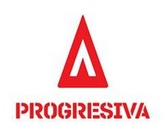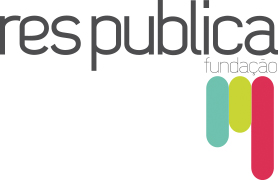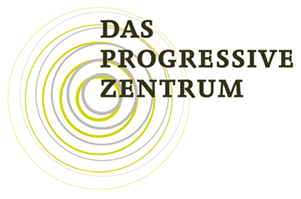FEPS EU enlargement publication series
Project
1. From EU enlargement fatigue to ambiguity
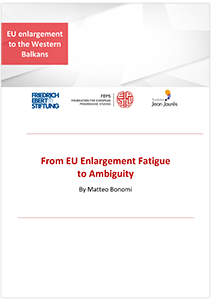 Despite the EU enlargement policy framework and its declared goals, the present EU-Western Balkan political and socio-economic relations do not promise a swift convergence and lasting transformation of the region. On the contrary, the current economic and political set-up in the Western Balkans favours the empowerment of ‘charismatic strong men’ unchecked by democratic mechanisms. Such a model increasingly resembles the Chinese and Russian model of political capitalism.
Despite the EU enlargement policy framework and its declared goals, the present EU-Western Balkan political and socio-economic relations do not promise a swift convergence and lasting transformation of the region. On the contrary, the current economic and political set-up in the Western Balkans favours the empowerment of ‘charismatic strong men’ unchecked by democratic mechanisms. Such a model increasingly resembles the Chinese and Russian model of political capitalism.
The devastating consequences of Covid-19 outbreak have exacerbated this reality, further highlighting the shortcomings of EU policy toward theregion and these countries’ economic and political divergence form EU standards.
Against this backdrop, EU enlargement framework urgently needs to be supplemented with a more progressive political agenda, to navigate through these doomy and gloomy days. The Western Balkans should be included in the EU common response to the pandemic on a number of issues, among which: health and economic recovery plans; the defense of the rule of law and democratic governance; as well as foreign policy matters.
2. Dealing with EU accession in times of uncertainties: From halfway commitments to overlapping agendas
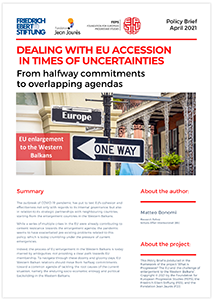 “The process of EU enlargement in the Western Balkans is today marred by ambiguities” writes Matteo Bonomi, Research Fellow at the Istituto Affari Internazionali (IAI), at the beginning of this Policy Brief.
“The process of EU enlargement in the Western Balkans is today marred by ambiguities” writes Matteo Bonomi, Research Fellow at the Istituto Affari Internazionali (IAI), at the beginning of this Policy Brief.
The publication aims at investigating the current developments of the EU enlargement agenda in the Western Balkans and the main obstacles it is facing. It highlights the existence of resistances towards this policy and claims that the Covid-19 pandemic has exacerbated an already complex situation.
According to Matteo Bonomi, the EU-Western Balkan relations should move from halfway commitments toward a common agenda and need to tackle the root causes of the current situation. Among the main problems of the region, the author highlights the “enduring socio-economic regression, unresolved constitutional disputes and backsliding in democratic standards”.
3. Challenges for EU enlargement in a post-covid scenario
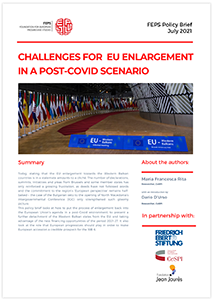 Today, stating that the EU enlargement towards the Western Balkan countries is in a stalemate amounts to a cliché. The number of declarations, summits, initiatives and pleas from Brussels and some member states has only reinforced a growing frustration, as deeds have not followed words and the commitment to the region’s ‘European perspective’ remains half-baked – the case of the Bulgarian veto to the opening of North Macedonia’s Intergovernmental Conference (IGC) only strengthened such gloomy picture.
Today, stating that the EU enlargement towards the Western Balkan countries is in a stalemate amounts to a cliché. The number of declarations, summits, initiatives and pleas from Brussels and some member states has only reinforced a growing frustration, as deeds have not followed words and the commitment to the region’s ‘European perspective’ remains half-baked – the case of the Bulgarian veto to the opening of North Macedonia’s Intergovernmental Conference (IGC) only strengthened such gloomy picture.
This policy brief looks at how to put the process of enlargement back into the European Union’s agenda in a post-Covid environment, to prevent a further detachment of the Western Balkan states from the EU, and taking advantage of the new financing opportunities of the period 2021-27. It also look at the role that European progressives should play in order to make European accession a credible prospect for the WB 6.
4. Next steps for progressive commitment to EU enlargement
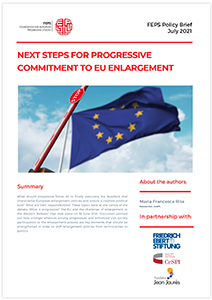 What should progressive forces do to finally overcome the deadlock that characterise European enlargement policies and ensure a credible political turn? What are their responsibilities? These topics were at the centre of the debate “What is progressive? The EU and the challenge of enlargement to the Western Balkans” that took place on 18 June 2021.
What should progressive forces do to finally overcome the deadlock that characterise European enlargement policies and ensure a credible political turn? What are their responsibilities? These topics were at the centre of the debate “What is progressive? The EU and the challenge of enlargement to the Western Balkans” that took place on 18 June 2021.
The discussion pointed out how stronger alliances among progressives and enhanced civil society participation to the enlargement process are key elements that should be strengthened in order to shift enlargement policies from technicalities to politics.























